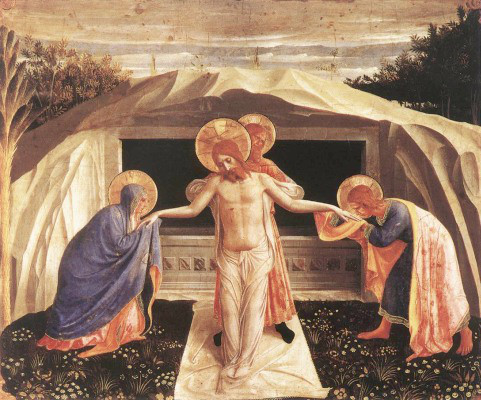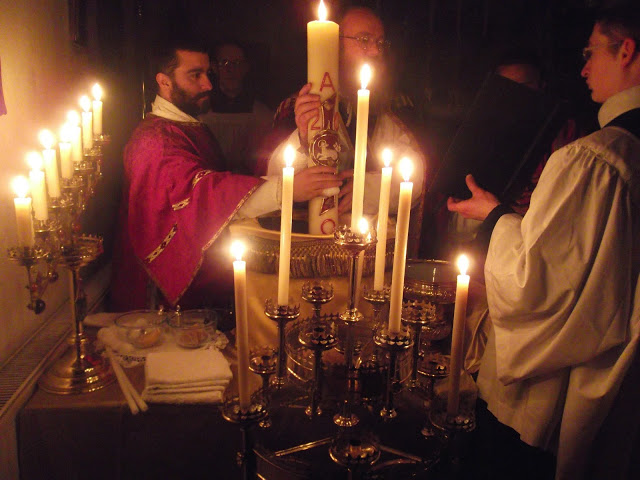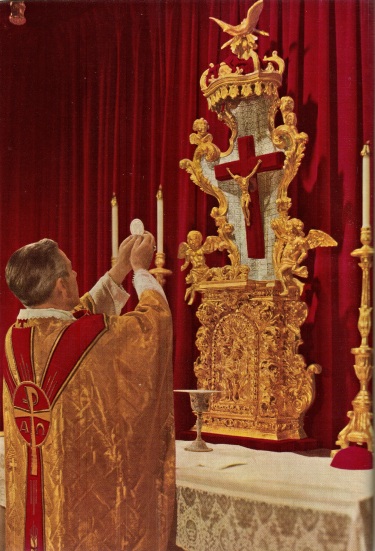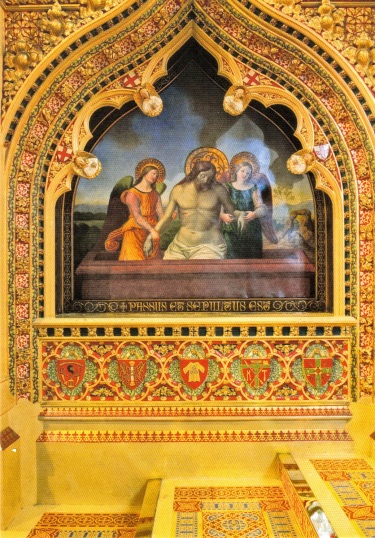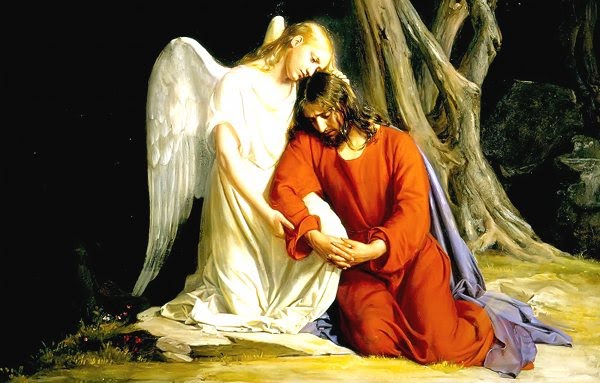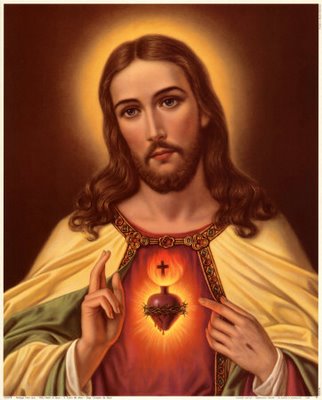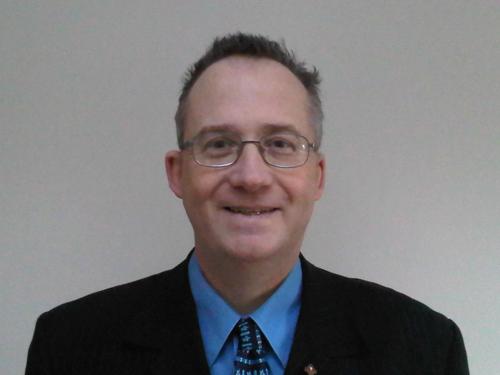St. Paul: He Who raised up Jesus Christ from the dead will give life to your perishable bodies too
 Torch of The Faith News on Thursday 09 April 2015 - 10:49:22 | by admin
Torch of The Faith News on Thursday 09 April 2015 - 10:49:22 | by admin
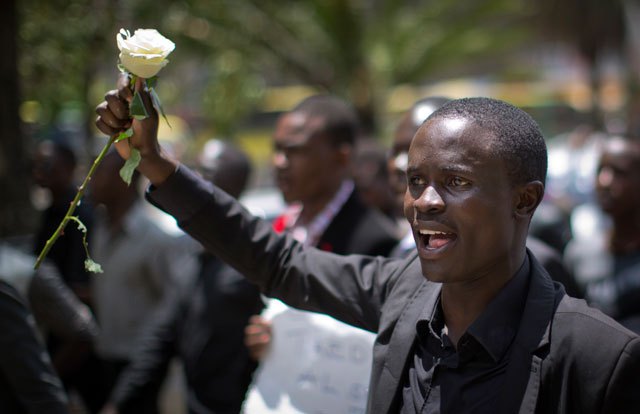
It is already one week since the Church passed through the mysteries of Holy Thursday in the Sacred Liturgy. Seven days have also passed since Kenya's Garissa University College was raided by Islamists. These wicked men separated the Christians out from the student body, before slaughtering them in cold blood. 148 were killed - many of them had been shot in the head at close range. The Christian Post has printed harrowing accounts from survivors; who spoke of Christian students being lined up, mocked and made to phone their parents as they awaited execution. Perhaps the most chilling account has been provided by 21-year-old Maureen Manyego. Hiding in a wardrobe, she heard an Islamist taunting his Christian victims with the words: ''We are not bad guys, we are just here to make your Easter holiday better.''
Msgr. Luc Ravel, Bishop of the French military forces, has recently pointed out that Christians are increasingly finding themselves caught between a pincer movement between Islamist terror and the idolatrous promoters of secularism. Although his words were predictably met with censure from establishment liberals, many events bear him out.
Just a few weeks ago, 14 Christians were killed and over 70 injured when St. John's Catholic Church and Christ Church in the Pakistani city of Lahore were bombed by Islamists.
In that period, dozens more were beheaded by the Islamists of Boko Haram in Nigeria. Having killed thousands, this group has now taken to using chain-saws to carry out their macabre executions.
Although the Western media appears to have lost even the limited interest it did have, the brutal mass-murder of thousands of Christians, and other people, at the hands of Islamists continues to destabilize large swathes of the Middle East.Â
And as Msgr. Ravel alludes, Christians throughout Western society are being persecuted on a daily basis by secularists - and even by many of their 'co-religionists' - for refusing to conform to the homosexualist ideology being forced in many places, or even for just honestly witnessing to their faith in their places of work.Â
On Holy Saturday, we drew attention to the fact that the Traditional Missal invites Catholics to unite themselves at the Easter Vigil with all those who have suffered for the Faith since the times of the Early Church. The Missal recalls that the early period of the Church was a time marked by persecution and the driving underground of Catholic communities; a time when Baptism frequently preceded Martyrdom, when the sufferings and the joys of Christians were equally intense.Â
Of course, many Christians now find themselves living again through such times. All the cultural, legal and spiritual indications suggest that this is a reality which will likely increase and become even more widespread in the times ahead. What will each of us say if we are asked: ''Are you a Christian? Aren't you one of His disciples?'' The time to prepare our hearts is now.Â
Still, it will be reliance on Christ and His Grace - rather than by worrying unduly - that will best prepare us to live by God's Will; in whatever way He calls us to do so.
In these days of the Easter Octave, we can also take comfort from the fact that Jesus Christ is always in charge. He has destroyed death and opened Heaven, to those who love Him and keep His Commandments, by the mysteries of His Life, Death, Resurrection and Glorious Ascension.Â
Today's Sacred Scripture reading from Morning Prayer in the Divine Office (post-1971 compilation) is worth reflecting on during the day.Â
'If Christ lives in you, then although the body be a dead thing in virtue of our guilt, the spirit is a living thing, by virtue of our justification. And if the Spirit of Him who raised up Jesus from the dead dwells in you, He who raised up Jesus Christ from the dead will give life to your perishable bodies too, for the sake of His Spirit Who dwells in you' (Romans 8:10-11).
'Glory to You! You built Your Cross as a bridge over death' - An Easter Sermon by St. Ephraem
 Torch of The Faith News on Wednesday 08 April 2015 - 11:37:45 | by admin
Torch of The Faith News on Wednesday 08 April 2015 - 11:37:45 | by admin
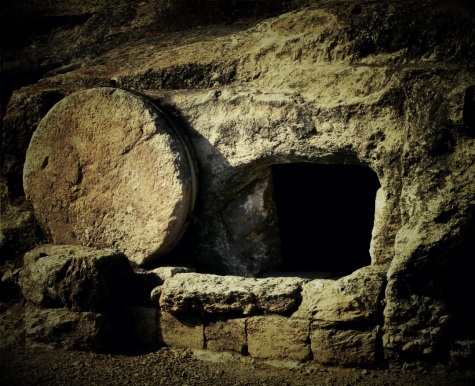
We live in a time when it seems that leaders will not even shrink from using the liturgical ceremonies of the Church to further the radical ideologies of the world. Rather than dwell on such subversions during these days of the Easter Octave, we are posting below a sermon of St. Ephraem (d. 373AD) for the edification and encouragement of our readers.
Christ's Cross, the Salvation of the Human Race (Sermon on Our Lord 3-4.9, by St. Ephraem).
Our Lord was trodden underfoot by death, and in turn trod upon death as upon a road. He submitted to death and endured it of His own free will, in order to destroy death against death's will. For Our Lord went out carrying His Cross, according to death's wish; He cried out on the Cross and led the dead out from Hell, against death's wish.
Death killed Him through the body which He bore; the same body was the weapon with which He conquered death. His divinity was hidden beneath His humanity and came to death, which killed Him and itself was killed. Death killed His natural life, but in its turn His supernatural life killed death.
And so, since death could not devour Him without a body and the world of the dead could not swallow Him up without flesh, He came to the Virgin, so that He might receive from Her a chariot on which to ride to the under-world. In the body He had assumed He entered death's domain, broke open its strong-room and scattered the treasure.
And so He came to Eve, the mother of all the living. She is the vineyard whose hedge death opened by Eve's own hand so that she might taste death's fruit. Thus Eve, the mother of all the living, became the source of death for all the living.
But Mary blossomed, the new vine compared with the old vine, Eve. Christ, the new life, lived in Her, so that when death, brazen as ever, approached Her in search of his prey, life, the bane of death, was hidden within Her mortal fruit. And so when death, suspecting nothing, swallowed Him up, death set life free, and with life a multitude of men.
This glorious son of the carpenter, who set up His Cross above the all-consuming world of the dead, led the human race into the abode of life. Because through the tree the human race had fallen into the regions below, He crossed over on the tree of the Cross into the abode of life. The bitter shoot had been grafted on to the tree, and now the sweet shoot was grafted on to it so that we might recognize the One Whom no creature can resist.
Glory to You! You built Your Cross as a bridge over death, so that departed souls might pass from the realm of death to the realm of life.
Glory to You! You put on the body of a mortal man and made it the source of life for all mortal men.
You are alive! Your murderers handled Your life like farmers: they sowed it like grain deep in the earth, for it to spring up and raise with itself a multitude of men.
Come, let us offer Him the great, universal sacrifice of our love, and pour out before Him our richest hymns and prayers. For He offered His Cross to God as a sacrifice in order to make us all rich.Â
Easter Octave - Contemplating the Grace of Baptism
 Torch of The Faith News on Tuesday 07 April 2015 - 10:56:39 | by admin
Torch of The Faith News on Tuesday 07 April 2015 - 10:56:39 | by admin
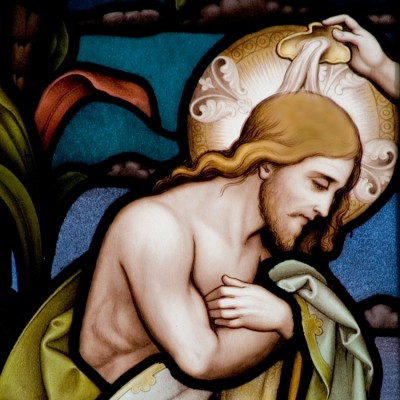
In the early centuries of the Church, the neophytes, or newly-baptized, were taken to the principle churches of Rome, during these days which constitute the Octave of Easter. They would have begun, yesterday, at St. Peter's and continued today to St. Paul's. In the evenings, the neophytes gathered together at St. John Lateran and renewed in prayer the memory of their recent baptism and incorporation into the Church.
As we know, Baptism applies to individuals the Death and Resurrection of Christ: those who are baptized are thus risen with Him. The Catholic Church traditionally encouraged believers to ponder, this week, on the mystery of the raising of fallen man from the darkness of sin and idolatry to the light of grace in Jesus Christ.
To receive the grace of Baptism and the gift of Faith is a rich privilege in any age. It is even more so in a time of such widespread indifference, secularization and loss of faith as this. How few people in contemporary Britain, marked Easter this year with any form of religious commitment or devotion!
Readers might join us today in giving thanks for the grace of their own Baptism. Let us also pray for those who have not yet received this grace, to be given Baptism into the One True Faith.
'The Lord thundered from Heaven and the Most High gave His voice: and the fountains of waters appeared, alleluia!'(Offertory, Ps 17, Easter Tuesday, Traditional Latin Mass).Â
Christus Resurrexit - Alleluia!
 Torch of The Faith News on Sunday 05 April 2015 - 10:05:23 | by admin
Torch of The Faith News on Sunday 05 April 2015 - 10:05:23 | by admin
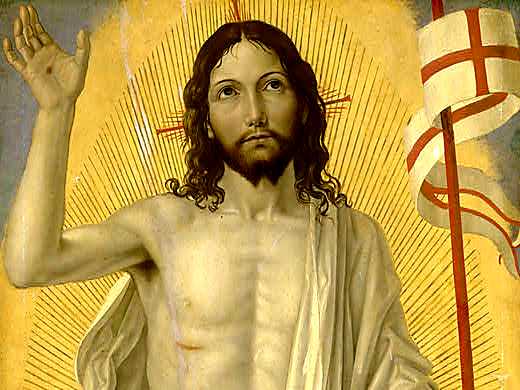
The Resurrection of Jesus Christ was the fulfillment of all the prophecies and promises of the Old Testament. It was the triumph of Christ, the proof of His Divinity and Doctrine. It is the central point of Christianity and of the liturgical life of the Church. Easter is the oldest and most solemn feast of the Christian year. The Church celebrates this feast of the triumph of Christ with the deepest joy: the Alleluia (praise be to God) is repeated after every Antiphon, Versicle and Response, to express her overflowing joy. The Paschal Candle is lit during Mass to signify that the Light of the World is with us.
There is also a secondary motive in the Easter liturgy: the Church celebrates with thankful joy the effect of Christ's Resurrection produced in her children through Baptism, which raises man from death in sin to the pledge of eternal life in Jesus Christ. The Church sees in those who are converted from the darkness of unbelief to the life of grace the continuation and effect of the Resurrection. The first words of the Introit: ''I arose and am still with you,'' addressed by Christ to the Church, are deep with spiritual meaning.
It is therefore so beautiful to see the new life coming into the Church at the Easter Vigil through the witness of the Institute of Christ the King Sovereign Priest (ICKSP). Let us give thanks for John who was received into the Catholic Church at the Shrine Church of Ss Peter, Paul and Philomena; and for Sonia and James who were both received into the Catholic Church, through Baptism and making their First Holy Communion, at the Shrine of St. Walburge's last night. Deo Gratias! Please pray for these new converts.
We wish every joy, grace and blessing of the Easter Season to our readers! Â
Holy Saturday 2015
 Torch of The Faith News on Saturday 04 April 2015 - 11:16:04 | by admin
Torch of The Faith News on Saturday 04 April 2015 - 11:16:04 | by admin
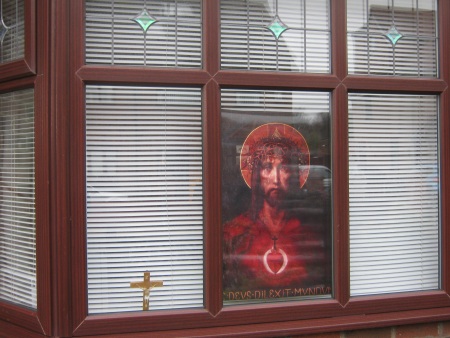
Regular readers will recall that Dad always displayed a Crucifix in the front window as a Christian witness. At Christmas and Easter he added special cribs and posters that he had designed with an evangelizing message.
When we went to get them this week, we realized that we'd gone and stored them all in the dark recesses of the loft with the Christmas box. Doh!
Anyway, we found and used our poster of Jesus Christ crowned with thorns for Good Friday instead. Catholic to the Max sell prints of this image in the USA, and we first had our copy up on the wall of our study in Steubenville, Ohio.Â
At the base of this image is the message Sic Deus Dilexit Mundum. These, of course, are the Latin version of the words 'God so loved the world' from John 3:16. Although the poster displaced - and rather dwarfed - the small crucifix from the middle window, it fitted the space perfectly and provided an arrestingly powerful reminder of Our Lord's Passion.Â
As it can be so difficult to find decent religious cards in many shops these days - it is mostly chicks, daffodils and fluffy bunnies - we've been pleased to find that Card Factory are selling Easter cards bearing an image of Jesus with the full version of this text: 'For God so loved the world that He gave His only begotten Son, that whosoever believes in Him shall not perish but have eternal life.' There might still be some left; although they were going like hot cakes when we bought ours!
Today, as we prepare for the Holy Saturday Vigil, we contemplate the entombment of Our Lord Jesus Christ.Â
This is always a good opportunity to contemplate Our Lady of Sorrows in Her solitude.
The Blessed Virgin Mary suffered depths of sorrow that we cannot even begin to imagine. This is because She is without sin and is totally united to Jesus Christ. It is also because Her Son is the God-Man; the most beautiful, innocent and perfect.
Today, we might reflect on the fact that Our Lady has compassion on Her Son's Church as the Church goes through a Passion and Crucifixion - and even seems to be entering the tomb - in our own day. We may also consider the compassion Our Lady has for each one of us when we suffer for Her Son, or when we experience loss, grief or suffering ourselves.
Our Lady is the great model of Faith found in the Gospels. Throughout the darkness of suffering, She continues to believe with hope. We could ask Our Lady to help us today to enter into Her Holy Compassion for Her Son, for His Church and for poor sinners. May She increase our faith in the Resurrection and obtain the grace of conversion for all those whom we love.
The approaching Easter Vigil also gradually fills us with joyful expectation as this day progresses.
The Traditional Missal teaches that to understand these holy ceremonies and their magnificent unity, we need to recall their continuity with those of the first centuries of the Church.
In the earliest times, the Church observed Holy Saturday as a period of deep mourning and fasting for Our Lord laid in the Tomb. Towards evening, the catechumens assembled for their final scrutiny. Those who passed it successfully were exorcised and went through the ceremonies of the opening of the ears, renunciation of Satan and recitation of the Credo.Â
At sunset, the faithful gathered in the church for the blessing of the fire and of the candle that would light the church during the night. From the 4th Century, the ceremony of the blessing of the candle was instituted as an evening offering to God. This spread widely in the East and in the churches of Spain and Gaul. This ceremony survives in the Roman Liturgy in the Paschal Vigil. The candle is a symbol of Christ, the light of the world.
Then the long hours of the night were occupied with readings from the Scriptures, chants and prayers. The lessons and chants are particularly focused on the catechumens, and provide an outline of the events of Salvation History.
As dawn was appearing, the lessons concluded and the priest proceeded to the blessing of the font. Baptism was then solemnly administered in the Baptistery. Meanwhile, the greater part of the clergy and congregation, who had remained in the church, sang the solemn litany which brought the vigil to an end by imploring the mercy of God and the intercession of the court of Heaven for all their needs.
It was now Easter Sunday morning. Christ had risen. The newly-baptized entered the church in their white robes, the sacred ministers put on white vestments and the Holy Sacrifice of the Mass for Easter-day began.
When we attend the Easter Vigil we are continuing the practices begun in ancient times to celebrate and enter into the Resurrection of Our Lord Jesus Christ. The Sacred Liturgy helps us to enter these events and to receive their graces and fruits. For several years now, we have been attending the Easter Vigil - as well as most of the Masses we attend - in the Traditional Rite, and we have experienced first-hand the marked majesty and continuity of the expression of this Rite with ancient times. (Even allowing for the various changes brought in to this rite during the 1950's!).
The Traditional Missal invites all who will follow these ceremonies tonight, to unite themselves with the spirit of the Christians of the first centuries of fervour and faith. These were times when the Church was persecuted and driven underground, when Baptism frequently preceded Martyrdom, when the sufferings and the joys of Christians were equally intense.
Each time we have celebrated the Easter Vigil in recent years, the surrounding culture seems to have slipped even further into new lows of immorality and nihilism, since the previous Easter. It is the same again this year. However, the Easter Vigil takes us from the darkness of death to the light of Resurrection in Jesus. Dear readers, let us pray that the joy of the Risen Christ, the prayers of Our Blessed Lady and the witness of the early Martyrs will strengthen, console and preserve us throughout our earthly sojourn.Â
We wish all of our readers a Blessed Holy Saturday.Â
Good Friday 2015
 Torch of The Faith News on Friday 03 April 2015 - 09:25:42 | by admin
Torch of The Faith News on Friday 03 April 2015 - 09:25:42 | by admin
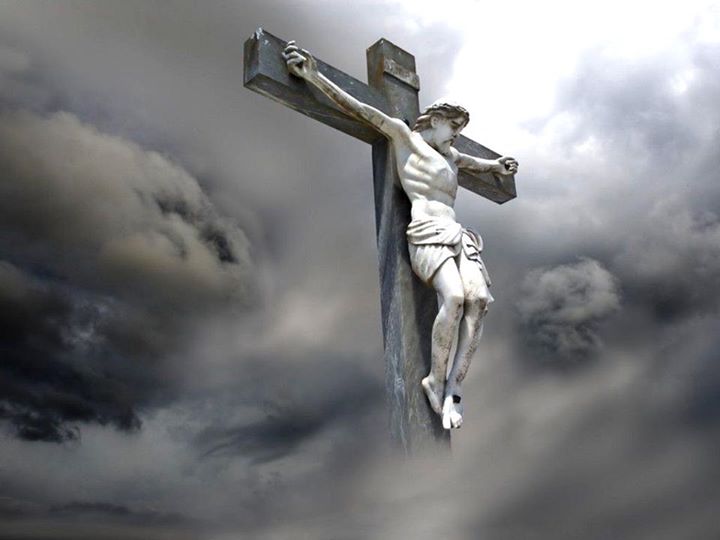
O my people, what have I done to thee? Or how have I offended you? Answer me. Because I led you out of the land of Egypt: thou hast prepared a Cross for thy saviour. Because I led you through the desert for forty years: And fed thee with manna, and brought thee into a land exceeding good: Thou hast prepared a Cross for thy saviour. What more ought I have done for thee, that I have not done? I planted thee, indeed, My most beautiful vineyard: and thou hast become exceeding bitter to me: for in my thirst thou gavest me vinegar to drink: and with a spear thou hast pierced the side of thy saviour.
I fed thee with manna in the desert, and thou hast assaulted me with blows and scourges. I gave thee the water of salvation from the rock: and thou hast given me gall and vinegar to drink. For thy sake I struck the kings of the Canaanites: and thou hast struck my head with a reed. I gave thee a royal sceptre: and thou hast given a crown of thorns for my head. I exalted thee with great strength; and thou hast hanged me on the gibbet of a cross.
O Holy and Immortal One - Have Mercy on Us.
(From the chanted Reproaches during the Veneration of the Cross).Â
This is a Day of Fasting and Abstinence in the Catholic Church. The Sacred Liturgy today is particularly solemn and takes us into, and through, the saving events of Christ's Passion and Death.
Christ has loved us unto death on a Cross. Today, the Church gives us a special opportunity to enter into His unfathomable mercy and love for each and all of us. Let us enter into that love by sincere repentance for all our sins, by making a good Confession and by making acts of charity towards others out of love for Him.
Great Britain has changed dramatically in recent years. In our parents' day huge numbers went to church on Good Friday, the shops were closed and the radio stations played sombre music. When we were young adults, the churches were still packed for the Easter Triduum and most shops still remained closed. In 2015, the bookmakers, pubs, shops and supermarkets now bustle with trade, whilst attendance at the liturgies is in free-fall in many places. Let us not be discouraged, but rather console our Saviour in His Passion and make reparation for those who do not know or love Him. The 3pm Good Friday liturgy gives us such an important opportunity to do this.Â
Readers are reminded also that today marks the beginning of the Divine Mercy Novena. Jesus asked St. Faustina to prepare for the Feast of Divine Mercy with a Novena commencing on Good Friday. We invite you to prepare for this great feast by daily recitation of the Chaplet of Divine Mercy from today until Divine Mercy Sunday.
A Blessed Good Friday to you all.Â
Holy Thursday 2015
 Torch of The Faith News on Thursday 02 April 2015 - 12:26:00 | by admin
Torch of The Faith News on Thursday 02 April 2015 - 12:26:00 | by admin
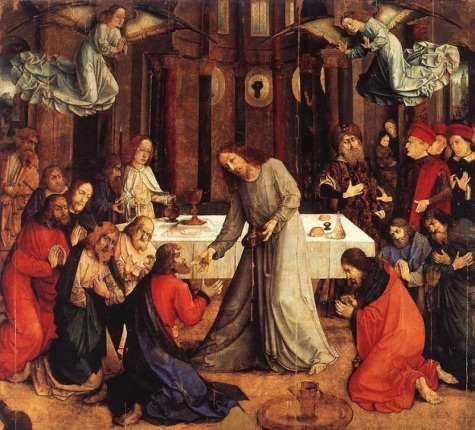
In the Jewish Pesach Seder meal, it is traditional for the youngest member of each family to ask, ''What makes this night different to all other nights?''
As we recall each year, this night is indeed different.
It is the night on which Jesus Christ instituted the Holy Sacrifice of the Mass, and the Sacred Priesthood that would offer It down through all the ages until His Glorious Second Coming.Â
One of the great mysteries of the Catholic Faith is spoken of in terms of the principle of anamnesis.Â
This gives a name to the mystery by which the Sacred Liturgy makes us present to the actual saving events of Christ's Life, Death, Resurrection, Ascension and the sending of the Holy Spirit. By opening ourselves to these mysteries, we can receive their fruits.
On the night of Holy Thursday, the Catholic Church enters into the Sacred Triduum. The three pivotal liturgies of Holy Thursday, Good Friday and Holy Saturday are the beating heart of the Church's liturgical year.
The Catechism of the Catholic Church recalls: 'Beginning with the Easter Triduum as its source of light, the new age of the Resurrection fills the whole liturgical year with its brilliance... Therefore Easter is not simply one feast among others, but the 'Feast of feasts,' the 'Solemnity of solemnities,' just as the Eucharist is the 'Sacrament of sacraments' (the Great Sacrament). St. Athanasius calls Easter 'the Great Sunday' and the Eastern churches call Holy Week the 'Great Week' (CCC 1168;1169).
On this night, the Mass of the Lord's Supper helps us to actually enter into the mystery of Our Lord's institution of the Mass and the Priesthood. When the feet of 12 men are washed by the priest, we glimpse something of the mystery of priestly service, and of the regeneration Christ gives to us through the gift of Baptism.Â
Another aspect, which is much overlooked today, can be recovered by returning to the sources of Origen, St. Ambrose and St. Bernard. In relation to this washing, these writers remind us of the pure state of heart needed to receive the Most Holy Eucharist. We recall here, that one of the precepts of the Church is to make our Easter duties with a good Confession and worthy reception of Holy Communion.
At the end of the Mass of the Lord's Supper, the Blessed Sacrament - Our Lord's Real Presence, Body, Blood, Soul and Divinity - is solemnly processed to an Altar of Repose; which is beautifully adorned with candles for silent prayer and veneration.
The Holy Sepulchre at the Church of St. Giles, Cheadle.
This awesome period of silence is one of the most sacred times each year; when grace is so tangible it seems to thicken the air. In this holy time, we are enabled to enter into Our Lord's Hour in Gethsemane. This is a special opportunity to remain with and console Our Lord in His Passion.
It is in this Hour that Jesus Christ makes the act of acceptance in His Human Will, in union with His Divine Will, to drink the chalice of suffering in order to save our souls. He gives us this great example of conforming our wills to God's Holy Will.
In St. Matthew's Gospel 24:40, Jesus asks His disciples, who had fallen asleep while He prayed in Gethsemane, ''Could you not wait with me for one hour?'' On this sacred night, we have an opportunity to make reparation for our own lack of watchfulness by entering into His Hour with love and devotion.
What a grace-filled opportunity for Catholics to receive afresh - and respond to in their hearts and wills - these words from the Catechism of the Catholic Church: 'Jesus knew us each and all during His life, His agony and His Passion, and He gave Himself up for each one of us: 'The Son of God... loved me and gave Himself for me' (Galatians 2:20). He has loved us all with a human heart. For this reason, the Sacred Heart of Jesus, pierced by our sins and for our salvation (John 19:34), is quite rightly considered the chief sign and symbol of that... love with which the Divine Redeemer continually loves the Eternal Father and all human beings without exception' (CCC 478).
On this night, the Sacred Liturgy of the Catholic Church gives us a particularly important opportunity to receive this Love anew and to respond to it. We at Torch of The Faith urge all Catholics - and all of our family, friends and neighbours: Do not miss this opportunity!
(Those attending are reminded that only baptized Catholics in the state of grace are invited to receive Holy Communion).
The Sacrament of Marriage Gives Spouses the Grace to Love Each Other With the Love with Which Christ Loves the Church
 Torch of The Faith News on Wednesday 01 April 2015 - 09:22:25 | by admin
Torch of The Faith News on Wednesday 01 April 2015 - 09:22:25 | by admin
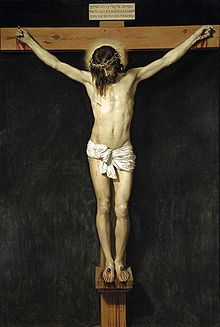
Sacred Scripture: St. Paul taught: ''Husbands, love your wives as Christ loved the Church... This is a great mystery, and I mean in reference to Christ and the Church (Ephesians 5:25,32).Â
Reflection:Â During Holy Week we recall just how it was that Our Lord Jesus Christ loved the Church. He made a total gift of self-sacrifice on the Cross. There can be no greater love than this.
Doctrine: Applying these timeless words of St. Paul, the Council of Trent explained: 'The sacrament of Matrimony signifies the union of Christ and the Church. It gives spouses the grace to love each other with the love with which Christ has loved His Church; the grace of the sacrament thus perfects the human love of the spouses, strengthens their indissoluble unity, and sanctifies them on the way to eternal life' (DS 1799).Â
Reflection: In light of these foundational teachings from Sacred Scripture and Tradition, we can see why the present attacks on the Church and on marriage are so grave. The nature of the Church as Christ's beloved Bride, and the sacrament of Matrimony as its visible and efficacious sign, are firmly in the enemy's cross-hairs.
Doctrine: The Catechism of the Catholic Church gives some practical application of these clear teachings in CCC 1664: 'Unity, indissolubility, and openness to fertility are essential to marriage. Polygamy is incompatible with the unity of marriage; divorce separates what God has joined together; the refusal of fertility turns married life away from its ''supreme gift,'' the child.'
Reflection: By God's grace, these words from Sacred Scripture and Tradition have helped us as a married couple to have a deeper conversion to Christ and to His love.
Pastoral Practice:Â The Crucified Christ, at the very heart of sacramental marriage, is the source of grace and the example for spouses to love God, each other and other people.
The Cross at the centre of Catholic marriage, helps spouses, who embrace it, to grow toward a more mature understanding of the nature of true love; a love which prefers to give than to receive.Â
The Cross helps spouses, who embrace it, to forgive one another; it is the focus of the deep unity in their marriage.
In its light, they could not imagine for one moment using contraception. To do so would close them off from Christ and from each other. It would shutter them from the total self-sacrificing gift of themselves to God, to each other and to any children that God may wish to bless them with. Instead of self-gift, married love would be thwarted by contraception and even perverted towards hardness of heart, lust and selfishness.
The Cross at the centre of married love aids couples when they suffer bereavement, failure, illness, infertility, misunderstanding or unemployment. It is their source of strength when caring for each other, their children or infirm relatives.
As the saints teach us, the Cross is the Royal Road, by which we may reach Heaven.
Doctrine: 'By coming to restore the original order of Creation, disturbed by sin, He Himself gives the strength and grace to live marriage in the new dimension of the Reign of God. It is by following Christ, renouncing themselves, and taking up their crosses that spouses will be able to ''receive'' the original meaning of marriage and live it with the help of Christ. This grace of Christian marriage is a fruit of Christ's Cross, the source of all Christian life' (CCC 1615).
Concluding Reflection: In this article, we have drawn from Sacred Scripture and Tradition, and provided reflections on these; reflections which are rooted in the objective content of Church teaching and in our own practical experiences of receiving God's help to live by these central truths about marriage.
In recent decades, liberal dissenters used to argue that aging celibate priests had little to teach married couples about married life and issues such as contraception. Having dulled their consciences through collusion with sin and secularization, these souls mistook the spirit of the age for the sensus fidelium.Â
Tragically, not a few priests were misled or discouraged by these suggestions, whilst others actively encouraged them. Some of those who encouraged them are now in the highest positions of Church authority; in this and other countries. This has been a key aspect in the emergence of the present crisis.
We would suggest that today it is the other way round. Couples, such as ourselves, have been gradually helped by grace to get out of the attachment to sin which the culture we grew up in encouraged. (We do not mean to support the modernist notions of 'gradualism' here, but speak, rather, of the ongoing conversions in the Christian life. Put simply, all mortal sins need sacramental Confession and Absolution). We have been liberated and healed through Christ's power working in the sacrament of Matrimony and through the true and beautiful teachings of the Magisterium. Â
Couples who have received the grace to live by these true teachings are thus rather astounded by aging clerics telling folks today that they should accept contraception, divorce-'re-marriage' and sexual activity outside of married love. After all, having spent so long dissenting from the Magisterium on this issue, what can these dissenting clerics really teach us about marriage? Drawing on faulty Immanentism, many Modernistic clerics promote so-called experiential catechesis. If they are to be consistent with their own first principles, shouldn't Modernists then be open to the lived experiences of orthodox married people? Isn't that what 'consulting the laity' really means?Â
Having found the gold of Church teaching, many Catholic couples, like us, are bemused to be offered trash. We're even less enamoured to have it forced on us...
Bishop Michael Campbell - ACTA Has No Approval or Recognition from the Catholic Church in the Diocese of Lancaster
 Torch of The Faith News on Tuesday 31 March 2015 - 11:03:38 | by admin
Torch of The Faith News on Tuesday 31 March 2015 - 11:03:38 | by admin
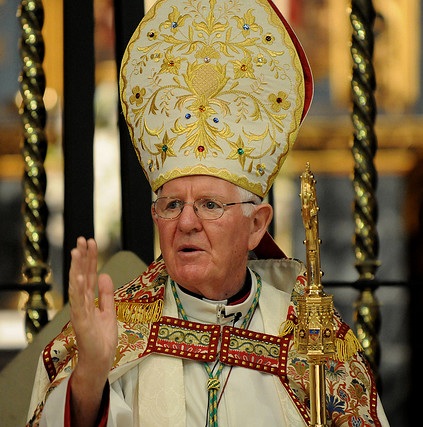
A great many of the Catholic faithful are concerned that the dissenting group ACTA have been welcomed into the Archdiocese of Liverpool by Archbishop McMahon, given tacit approval elsewhere, and been allowed to hold meetings in parishes throughout the entire country.Â
Just over a year ago, we expressed concern that ACTA had even held a meeting - on Tuesday 25th February, 2014 - at Cathedral House in the Diocese of Lancaster, with neither public correction or censure.
It is heartening therefore to read that Bishop Michael Campbell - with special reference to St. Ignatius of Antioch's ancient teaching that 'wherever the bishop appears, there let the people be, even as wheresoever Christ Jesus is, there is the Catholic Church' - has discerned and now made a clear statement concerning ACTA on his blog-site and through a response to their serious claims about him on BBC Radio Lancashire.Â
His Lordship states: 'As Bishop of Lancaster and thus as a Successor of the Apostles, I am charged, in accord with the teaching of the Second Vatican Council, with a special care in my ministry as 'overseer' to uphold the unity of the Church in this Diocese of Lancaster and so to guard against any attempt to confuse the faithful regarding authentic Catholic teaching and ministry in this Diocese.
In this light there appears at times a momentum for certain pressure groups in the life of the Church Universal. Amongst these at the present moment is a small but vocal interest or lobby group self-styled A Call to Action (ACTA) which happens to meet within the Diocese of Lancaster and other dioceses and appears to espouse positions - at times and among others - in opposition to the defined teaching of the Catholic Church on faith and morals.
This last week this group unexpectedly approached BBC Radio Lancashire to obtain some media attention. (Link to recording provided in original).
I need to make it clear that in my judgement, as Diocesan Bishop, ACTA moves well beyond its self-described aim of 'dialogue' on controversial issues on its agenda and so does not provide an assured authentic forum or interpretation of sound Catholic teaching and sound pastoral practice in this Diocese. Accordingly great care is required here from priests and people.
Furthermore, although individual Catholics are quite entitled to meet and express themselves and certainly discussion within parameters can be important and valuable, I have a duty at the same time to clarify for the faithful the status of such groups: This particular pressure group has no approval or recognition from the Catholic Church in the Diocese of Lancaster nor has it ever requested, as other groups do, as a matter of courtesy, formal ecclesial recognition from me.
Although this statement does not go as far as instructing parishes to ban ACTA from meeting on Church premises, His Lordship's position is nevertheless made crystal-clear. Bishop Michael Campbell is the first of the English Bishops to issue such a strong and unambiguous statement in defence of the Church's teaching in relation to ACTA and he deserves the gratitude of the faithful for it.
We are also grateful to him for going on air to make clear his position. This is especially encouraging to us as, early last year, we found ourselves in the lonely position of having to respond to a radio interview ACTA did about one of our articles.
The Catholic Church in these isles also owes a debt of gratitude to Deacon Nick Donnelly, who so consistently researched and exposed the dissenting agenda of ACTA from the very beginning.   Â
Although we had known for years about the American dissidents Call to Action, it was through reading Deacon Nick's careful and faithful research that we were first alerted to the emergence of ACTA, and its revolutionary agenda, in the United Kingdom.
May the Catholic Martyrs of Lancashire pray for the Church to maintain unity in the fullness of Christ's Truth.Â
I Bid You Stand - Men of the West!
 Torch of The Faith News on Monday 30 March 2015 - 11:03:55 | by admin
Torch of The Faith News on Monday 30 March 2015 - 11:03:55 | by admin
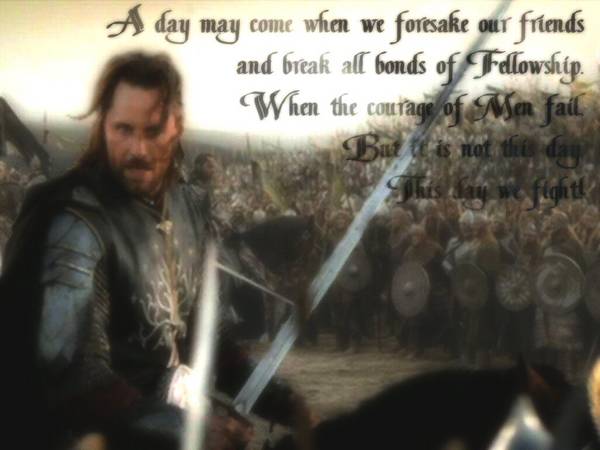
The full impact of Cardinal Nichol's criticism of the 500 priest signatories to the Support Marriage Letter struck me yesterday. I was trying to pray before Palm Sunday's High Mass and it loomed darkly in my thoughts. The sense of betrayal was made the more painful when observing the priest and laymen silently setting up the altar and sanctuary for the Blessing of Palms and the Holy Sacrifice. These included good men who have worked hard and suffered much for the Faith over the years; having received brick-bats instead of the laurels they deserve, they have nevertheless maintained their quiet dignity.Â
Whilst, in one sense, His Eminence's negative press statement represents merely the latest episode in a long saga of his undermining of Catholic sexual ethics, it does have a newly definitive ring to it.
Speaking with a good priest on Saturday evening, I repeated the suggestion that I had first made on this blog on Thursday. That is to say, that I then believed that the Cardinal had overplayed his hand this time; his actions would now be read in light of the well-publicised ''intimidation from senior churchmen'' which had been described in the preamble to the Support Marriage Letter. Soon after I had uttered these words to the priest, I was struck by a rather different understanding of the situation.Â
Perhaps this is not an overplaying of the Cardinal's hand at all, but rather his recognition of the late stage of the game that we all now find ourselves in. When the Cardinal uttered the infamous words ''Who knows what's down the road?'' the revolutionaries were still being kept in check - to a certain extent - during the days of Pope Benedict XVI's leadership. Things are very different now and their agenda has advanced dramatically; those leading the push against the Church's moral teachings no longer feel the need to hold back the reigns. They can make very public their support for the 'new morality' and their disdain for those wishing to keep the old religion. Ah, it seems that history repeats itself...
The last few weeks have seen bishops in different nations publicly contradicting orthodox Catholics that refused to go along with the dictatorship of relativism - in relation to false religions as well as to sexual immorality.
As those leading the onslaught on morality become more openly hostile, it would seem that the day for making excuses for them is long past. The revolutionaries within the Church have been undermining faith and morals for too long.Â
If they are not resisted now, these dissenters will debase our vocations as priests and as married men and women by subverting the teachings of Jesus Christ and the Sacred Magisterium of His Church.Â
They will reduce marriage to mere concubinage.Â
They will collude with secularists in government to force your young children to attend compulsory sex-education. They will have your daughters and nieces given morally-relative lessons on abortion and your sons and nephews on sodomy. They will further the sexual revolution and the wholesale abuse of women - and the pre-born - by the acceptance of contraception.
Worse than all these, they will sacrifice Our Lord and Saviour Jesus Christ, Truly Present in the Blessed Sacrament, to their new 'pastoral plans without doctrine' and their new mercy without repentance.Â
Anyone who resists them will be labelled, persecuted and exiled by them as a contemporary 'doctor of the law' or a latter-day Donatist.Â
All of this is already happening.
Neville Chamberlain learned the important historical lesson that oppressors cannot be appeased. They must be resisted. I am not calling for an irreligious revolution here, but I am pointing out that Catholic men need to stand together and call these leaders out in order to get them to live up to their episcopal vocations in living, defending and handing on the True Faith. Catholic men need to make clear the fact that we want good moral leaders. We want real men to inspire us and to help us protect our wives, children and neighbours. When good men do not stand together they are the more easily divided and bullied into compliance or defeat. Â
When Benjamin Franklin signed the Declaration of Independence, he famously stated: ''We must all hang together, or assuredly we shall all hang separately.''
J.R.R. Tolkien had a keen grasp of the realities of spiritual warfare and the battle for the soul of the West. In the Lord of the Rings Trilogy, he expressed much Catholic truth through the medium of fictional creative-writing. Tolkien wrote an inspiring speech for his character King Aragorn, which is given to rally the troops just before the Battle at the Black Gate. The speech has much in it to inspire Catholic men today. Men who want to resist sin in their own hearts and seek holiness. Men wanting to protect Christ's Church and the Blessed Sacrament. Men who will rise to protect their priesthood, their marriages, their sons and their daughters from the onslaught of the Modernist revolutionaries.
Here are the words of King Aragorn at the Black Gate: ''Hold your ground. Hold your ground! Sons of Gondor, of Rohan, my brothers! I see in your eyes the same fear that would take the heart of me. A day may come when the courage of men fails, when we foresake our friends and break all bonds of fellowship, but it is not this day. An hour of wolves and shattered shields, when the age of men comes crashing down! But it is not this day! This day we fight! By all that you hold dear on this good Earth, I bid you stand, Men of the West!''
You might make a start by clicking the new link on our Links Page to the excellent Juventutum Durham and adding your name to the letter in support of the 500 courageous priests - May God bless them. Â








